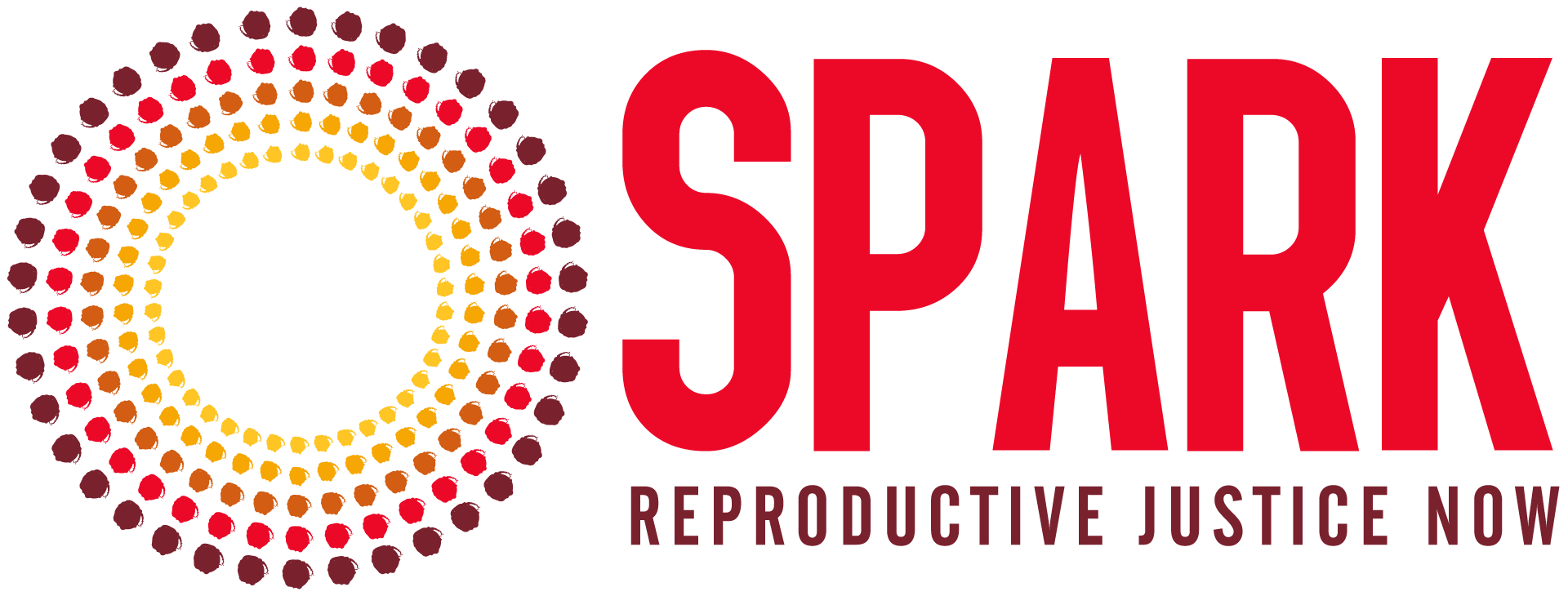SPARK is dedicated to creating the resources that we need to build and strengthen our communities fighting for reproductive justice in Georgia and the South.
Through radical analysis, community conversations, and people driven research, SPARK has been able to develop a unique mixture of resources and media that provide lessons, tools, art, stories, and models for effectively building and sustaining a powerful Southern reproductive justice movement.
Public Comment for the Proposed Title 9 Regulations (2022)
Archiving as a tool for Reproductive Justice Potentialities: on Black Trans Women and Women of Color Autonomy (2022)
Self Managed Abortion 1-Pager (2021)
Gender Justice Timeline (Updated 2021)
IOOV Policy Briefs (2021)
- Abortion Access
- Black Community and Environment
- Black Immigration
- Comp Sex Ed
- Contraceptive Equity
- Maternal Health – Policy Brief
IOOV GA Runoff Voter Guide (2020)
Campfyre Zine (2019)
SPARK is very excited to announce our zine titled “Campfyre”!! Created by SPARK staff and 2019 FYRE Campers (now our 2019/2020 Health Advocacy Cohort), Campfyre is an ode to our ancestors. Campfyre includes photos, poems, essays, drawings, recipes and much more!
Different Forms of Activism Op-Ed (2019)
What are “Crisis Pregnancy Centers”? (2018)
This essay defines how Crisis Pregnancy Centers falsely, yet legally, present as clinics in an attempt to lure in persons seeking an abortion and persuade them to carry their pregnancy to term.
Crisis Pregnancy Centers Op-Ed (2018)
[download id=”1212″] (2014)
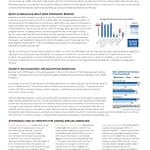 This fact sheet was prepared with the support of the National Center for Lesbian Rights and demonstrates why Medicaid expansion, as outlined in the landmark Patient Protection and Affordable Care Act (ACA), is important to uninsured, low-income the LGBTQQ African-American community and what you can do to make healthcare for all a reality.
This fact sheet was prepared with the support of the National Center for Lesbian Rights and demonstrates why Medicaid expansion, as outlined in the landmark Patient Protection and Affordable Care Act (ACA), is important to uninsured, low-income the LGBTQQ African-American community and what you can do to make healthcare for all a reality.
[download id=”1218″] (2014)
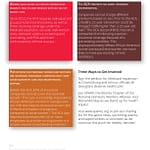 This fact sheet was prepared with the support of the National Center for Lesbian Rights and outlines the benefits of the landmark Patient Protection and Affordable Care Act (ACA) for LGBTQQ African-Americans.
This fact sheet was prepared with the support of the National Center for Lesbian Rights and outlines the benefits of the landmark Patient Protection and Affordable Care Act (ACA) for LGBTQQ African-Americans.
[download id=”1220″] (2014)
 This infographic outlines what the impact of expanding Medicaid eligibility would do for uninsured African Americans living in Georgia.
This infographic outlines what the impact of expanding Medicaid eligibility would do for uninsured African Americans living in Georgia.
[download id=”1222″] (2012)
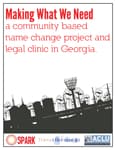 “Making What We Need: A Community Based Name Change Project & Legal Clinic in Georgia” is a reflection of our shared commitment to creating the resources that we desire to ensure that trans communities are provided the tools to bring about real, sustainable change in their lives. We hope that you will share this work with others. Let people know about it. Use the information to your advantage and let people know that they can do what they have long thought not possible. This guide outlines the steps involved in seeking a legal name change in the state of Georgia and is a small contribution to a broader effort to build a society where all can claim a space that is free from discrimination, intolerance, and prejudice.
“Making What We Need: A Community Based Name Change Project & Legal Clinic in Georgia” is a reflection of our shared commitment to creating the resources that we desire to ensure that trans communities are provided the tools to bring about real, sustainable change in their lives. We hope that you will share this work with others. Let people know about it. Use the information to your advantage and let people know that they can do what they have long thought not possible. This guide outlines the steps involved in seeking a legal name change in the state of Georgia and is a small contribution to a broader effort to build a society where all can claim a space that is free from discrimination, intolerance, and prejudice.
[download id=”1225″] (2011)
 Panelists Tina Reynolds (WORTH), Chara Fisher Jackson (ACLU of GA), Tamika Middleton (Black Women Birthing Resistance) and Benetta Standley (ACLU of FL) delivered dynamic presentations about the intersection between the birth justice, reproductive justice, and anti-prison industrial complex movements, an update on statewide anti-shackling campaigns in the South, and the ways in which incarcerated and formerly incarcerated women are working to shift the narrative and policies surrounding women and incarceration in the webinar “From Invisibility to Reality: Reproductive Justice for Currently and Formerly Incarcerated Women and Girls”. This is a download the webinar materials.
Panelists Tina Reynolds (WORTH), Chara Fisher Jackson (ACLU of GA), Tamika Middleton (Black Women Birthing Resistance) and Benetta Standley (ACLU of FL) delivered dynamic presentations about the intersection between the birth justice, reproductive justice, and anti-prison industrial complex movements, an update on statewide anti-shackling campaigns in the South, and the ways in which incarcerated and formerly incarcerated women are working to shift the narrative and policies surrounding women and incarceration in the webinar “From Invisibility to Reality: Reproductive Justice for Currently and Formerly Incarcerated Women and Girls”. This is a download the webinar materials.
[download id=”1227″] (2011)
 “Giving Birth Behind Bars” is a project conceived by and contributed to by members of the SPARK Reproductive Justice NOW Core Organizing Team. This amazing resource provides a powerful analysis of gender and the prison industrial complex, evaluates each county in Georgia’s restraint practices, provides popular education tools and resources that can be replicated in other campaigns and states, and finally brings the voices and experiences of medical providers and formerly incarcerated women together to demand an end to the barbaric and inhuman practice of shackling.
“Giving Birth Behind Bars” is a project conceived by and contributed to by members of the SPARK Reproductive Justice NOW Core Organizing Team. This amazing resource provides a powerful analysis of gender and the prison industrial complex, evaluates each county in Georgia’s restraint practices, provides popular education tools and resources that can be replicated in other campaigns and states, and finally brings the voices and experiences of medical providers and formerly incarcerated women together to demand an end to the barbaric and inhuman practice of shackling.
[download id=”1230″] (2008)
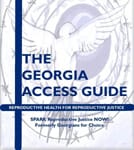 SPARK produces Georgia’s only comprehensive reproductive health guide focused on providing communities with vital information and creating more access for people and their communities to make holistic, empowered health decisions. In its 3rd edition, more than 7,000 Access Guides have been distributed throughout Georgia and the South.
SPARK produces Georgia’s only comprehensive reproductive health guide focused on providing communities with vital information and creating more access for people and their communities to make holistic, empowered health decisions. In its 3rd edition, more than 7,000 Access Guides have been distributed throughout Georgia and the South.
This 80 page guides provides a wide array of information covering sexual health education, STD/HIV testing centers, abortion providers in our state, and direct services organizations that provide support for victims of domestic violence, rape crisis centers, homelessness, mental health, LGBTQI, immigrant and refugee issues and beyond.
We believe that in order achieve reproductive justice we must first respond to the immediate needs of our communities. One of our most pressing needs is ACCESS; access to information, to health care, to education, to safe spaces, and to each other. The Access Guide is one step in creating greater access for all communities and, with the wealth of resources and information inside, is an indispensable tool for advancing reproductive justice.
ENJOYING THESE RESOURCES?
You can request a hard copy of these materials! Or if you have any questions or would like to share how you’re using these resources, please call 404.331.3250 or email us at info[at]sparkrj.org.
